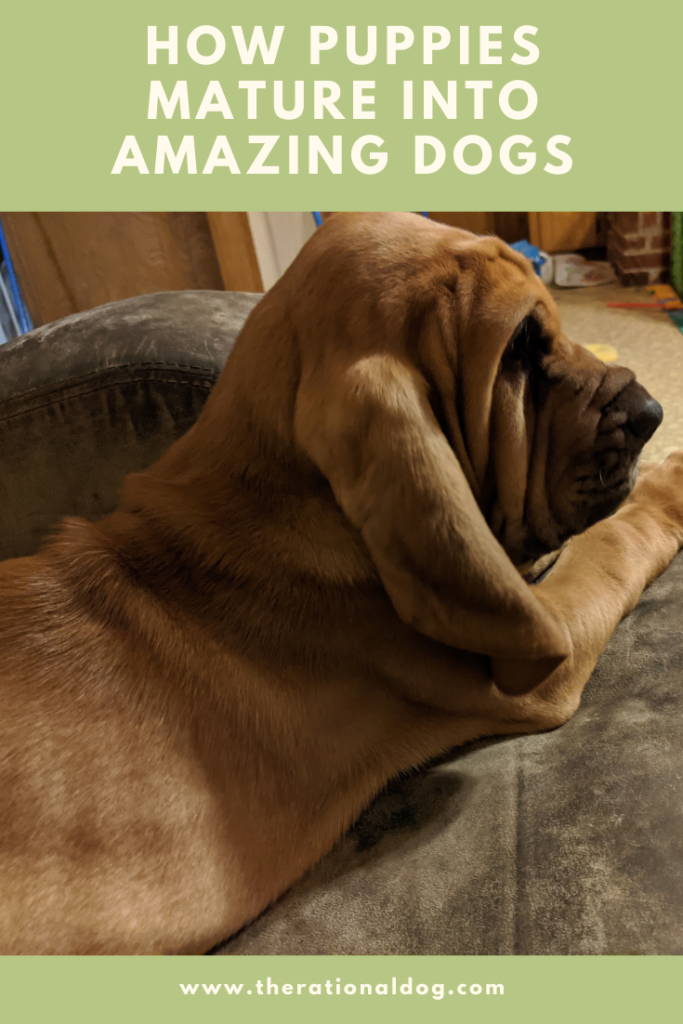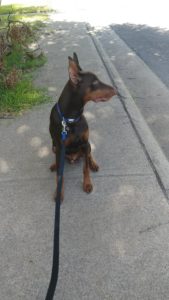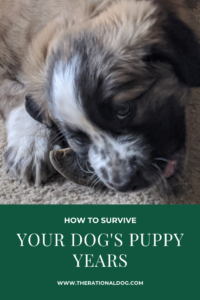Well, it’s that time of year again. Right after Christmas, there is a huge influx of people who are searching for help with their new baby puppies who came to be a part of their families during the holidays. Of course, people get puppies year round, but right here, at the beginning of a new year, there are a LOT of people who need help with their new canine babies!
Looking for help with your new puppy? Take our quiz here to get started on the right path!
What people do not tend to realize is that, just like humans, puppies follow a natural progression from their infancy and toddlerhood, to their adolescent months, and then finally to their adulthood. With the vast majority of dogs, they do not reach that coveted milestone of “adulthood” until about two years of age. So what happens during that first two years? Let’s talk about it!

Puppy-hood…the adorable beginning.
There are so few things in this world that are as cute as a baby puppy. The big eyes, the playful nature, and of course, the roly-poly fluff factor! By the time your puppy is old enough to come home with you, they are past infancy and into toddler-hood. I like to tell clients that up until about six months of age, you can compare a puppy to his human counter-part by counting the number of months old he is, and relating that in years to a human youngster. So, a three month old puppy is about equal in measure of maturity to a three year old human.
Because these little cuties are toddlers, the adorable can come with some difficulties. The most common ones that I hear about tend to be nipping and biting, potty training troubles, and destructive chewing. These are not just common, they are expected in puppies the same way that potty troubles, eating unfortunate things, and getting into everything that they should not is expected in toddlers. That is why puppy-proofing your home is such an important thing when you bring your new nugget home.
My solutions to all of the above problems are covered in my Train Your Puppy Like a Pro course, which will walk you step-by-step through those challenging first months. Cute? Absolutely. But you do need to establish routines, expectations, and a relationship based on respect right from the beginning to get to that golden “amazing adult” at the end of this maturity journey!
Adolescence…the not so cute months.

Usually starting at about six months of age, your puppy will migrate from the adorable toddler-young childhood stage to adolescence. Again, just like humans, adolescence is one of THE most challenging times in dog-ownership, and between the ages of 6-12 months of age is when I get 90% of my clients who are looking for help.
Yes, your puppy is still very young, but during these glorious months is when he really starts to feel his oats, so to speak. A puppy this age, between 6-12 months, is starting to near sexual maturity, and their bodies are a-flood with hormones. They are becoming more independent, and think that they know how the world works and how a savvy dog can get along in it.
Even if you choose to have your dog spayed or neutered at this point, much of their behavior will not be altered by that surgery. Just like kids in middle school, your puppy is really just a distracted doofus at this point, and they are masters at pushing boundaries and buttons. To get through this, your best bet is to get them started with some sort of training, whether it’s tricks, competition, or joining an obedience class.
You’ll also need to keep your expectations for their behavior extremely consistent. When your puppy is in this stage of adolescence, you should do your best to follow the Nothing in Life is Free protocol, which is exactly what it sounds like. For everything that your dog wants from you, he should do something for you first, whether that’s sit, touch with his nose, show you Leave It, or any behavior that he’s been taught. Teenage dogs who feel entitled to the good things in life without you as their gatekeeper can get pretty snotty, pretty quickly.
Also, just remember…Your dog will grow out of a LOT of the difficulties that you are facing right now. The extreme energy bursts, the refusal to listen or complete exercises, the frustrating lack of respect will all fade as your dog continues to grow and mature.
Young-adulthood…you’ve almost made it!
Once you’ve gotten past about 12 months, the ugly teenage months are usually behind you. At this point, your dog is nearing adulthood, and the frustrating lack of listening comprehension is usually a thing of the past. However, your dog is still a puppy, not yet an adult, and you can still expect to encounter a few blips in your relationship!
For example, my mother’s 20 month old collie has always loved to shred up paper and cardboard products. Now, even though Hildy is nearly a grown girl, she still will revert to her puppy roots and snag a nice milk carton or piece of mail and shred it into confetti all over the floor.
As with adolescent puppies, keep your expectations firm for your young adult dog, and work together with them to find the things that fill them with joy and they are really passionate about. Just as a 17 year old human is really starting to hone in on what their passions in life are, a young adult dog is doing the same thing. You will be doing them an immense service if you explore and find a way to help your dog express the things that they love. Whether it’s scent work, bite work, chasing and herding things, hunting and fetching, or snuggling up and making people happy, find what is the best thing for YOUR dog at this point, and you will give them a fuller and happier life than most of the house-dogs on this planet.
My training recommendations, exercises, and tutorials for dogs this age and older can be found in my Listen Up, Pup Obedience Course! Check it out and start teaching your dog from home!
Your newly adult dog.
Congratulations! You probably don’t even know how you survived for this long, but you made it to the other side of puppy-hood! Most dogs reach this coveted stage of maturity at about two years of age, but some don’t get there until closer to three, and some make it there early by about 18 months. Whenever you reach this stage, you’ll know it by how easy your life and relationship with your dog has suddenly become!
The panic when you remember that you forgot to put your dog in his crate before you left the house will subside, because his insane chewing and destructive urges will be a thing of the past. The apologetic eye rolls to strangers when your puppy loses his brain over the thought of being petted, or when he sees a squirrel on your walk will be a thing of the past because he is a grown up now!
Now that you’ve survived puppyhood, you can look forward to a long and happy relationship based on respect, fun, and partnership because of the trials and the hard work that you’ve put in already. So if you are in the middle of puppy-hood or adolescence, don’t give up! Your dog will meet you on the other side, a wonderful product of the relationship that you’ve built together through his youth!
